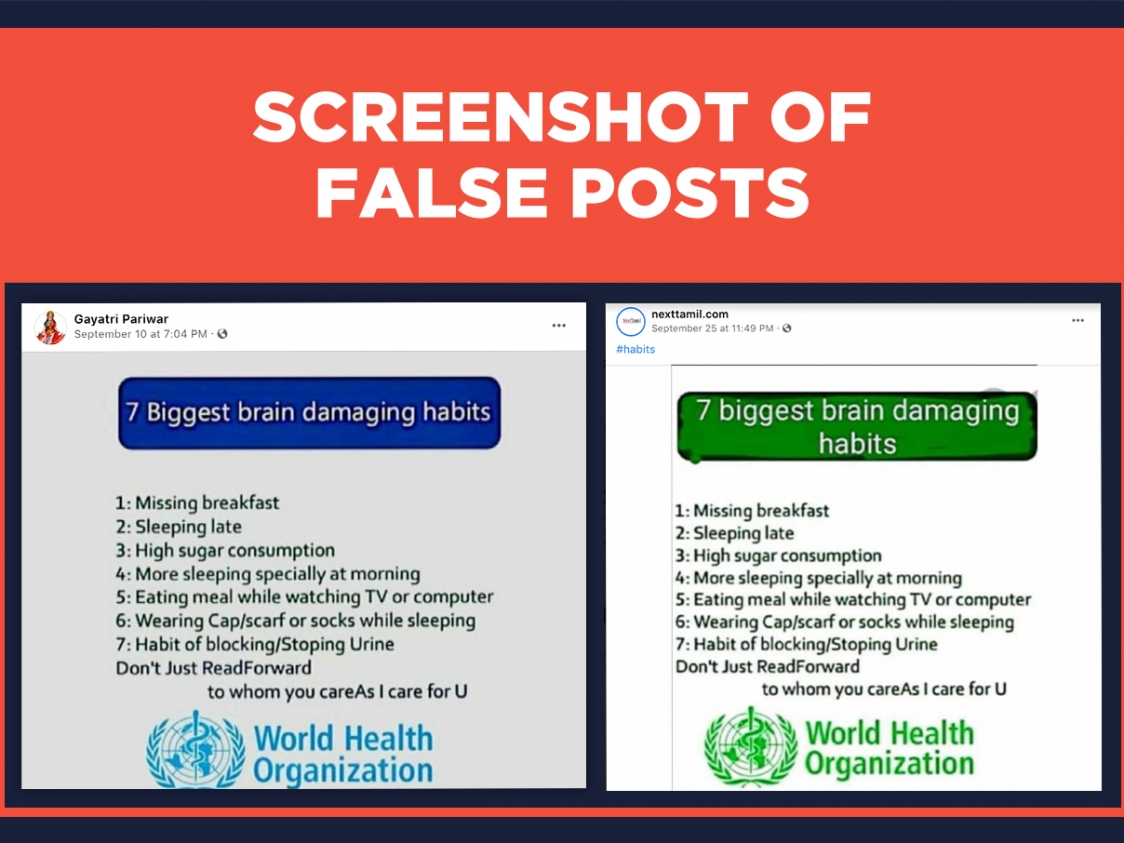1. Skipping sleep, chronic stress, and excessive screen time damage the brain.
Poor diet, lack of exercise, and substance abuse also harm brain health. Our daily habits significantly impact brain health. Many people unknowingly engage in activities that can cause long-term damage to their brains. Sleep deprivation, high-stress levels, and constant exposure to screens are common culprits.
An unhealthy diet lacking essential nutrients further exacerbates the problem. Additionally, a sedentary lifestyle and substance abuse, including alcohol and drugs, can severely impair cognitive function. Understanding these habits is crucial for maintaining a healthy brain. By making mindful changes, you can protect and enhance your cognitive abilities. Awareness and proactive steps are key to ensuring long-term brain health and overall well-being.
Lack Of Sleep
One of the most harmful habits for your brain is lack of sleep. Many people underestimate the importance of a good night’s rest. But, it plays a crucial role in maintaining brain health. Let’s explore how insufficient sleep impacts memory and cognitive function.
Impact On Memory
Sleep is essential for memory consolidation. During sleep, your brain processes and stores information. Without enough sleep, this process is disrupted.
Lack of sleep can lead to forgetfulness. You may find it hard to remember names, dates, or even daily tasks. Inadequate sleep can also affect your ability to learn new things.
| Sleep Duration | Memory Function |
|---|---|
| 7-9 hours | Optimal |
| 5-6 hours | Reduced |
| Less than 5 hours | Significantly impaired |
Cognitive Decline
Chronic lack of sleep can lead to cognitive decline. This means your brain’s ability to function properly decreases over time.
Lack of sleep can cause issues like poor concentration. You may find it hard to focus on tasks or make decisions. Over time, this can lead to more serious problems like dementia.
To support your brain health, aim for at least 7-9 hours of sleep each night. Here are some tips:
- Maintain a regular sleep schedule
- Avoid caffeine before bed
- Create a comfortable sleeping environment

Credit: www.daily-sun.com
Chronic Stress
Chronic stress is a silent brain killer. It sneaks into our lives and wreaks havoc. Stress affects your brain health negatively. It triggers a series of harmful events in your body.
Hormonal Imbalance
Chronic stress disturbs your body’s hormonal balance. Stress hormones like cortisol and adrenaline flood your system. High cortisol levels damage brain cells. This affects the hippocampus, which controls memory and learning.
Chronic stress also reduces serotonin. Low serotonin levels lead to mood disorders. Hormonal imbalance can cause depression and anxiety. These conditions further stress your brain.
Mental Fatigue
Mental fatigue is a common result of chronic stress. Your brain works overtime to manage stress. This constant strain tires your brain. You feel mentally exhausted and unable to concentrate.
Prolonged mental fatigue can lead to burnout. Burnout reduces cognitive function and decision-making skills. You may struggle with simple tasks. Chronic stress makes it harder to think clearly.
Here are some signs of mental fatigue:
- Difficulty focusing
- Memory problems
- Increased irritability
- Feeling overwhelmed
To protect your brain, manage your stress levels. Practice relaxation techniques like meditation and deep breathing. Get enough sleep and exercise regularly. Your brain will thank you!
Poor Diet
A poor diet can damage your brain over time. Foods lacking nutrients starve your brain. This can lead to serious mental issues. Let’s explore how a poor diet affects your brain health.
Nutrient Deficiency
Your brain needs vitamins and minerals. Without these, brain function suffers. A diet high in processed foods lacks essential nutrients. This includes:
- Vitamins like B6, B12, and E
- Minerals like magnesium and zinc
- Omega-3 fatty acids
Deficiency in these nutrients leads to cognitive decline. Your brain cannot work well without proper fuel. Eating junk food and sugary snacks deprives your brain of these nutrients.
Brain Fog
A poor diet often leads to brain fog. This is a state of confusion and lack of focus. You may feel forgetful and unable to think clearly. Brain fog affects daily activities and learning.
Here are some common signs of brain fog:
- Memory problems
- Difficulty concentrating
- Mental fatigue
- Slow thinking
Eating a balanced diet can clear brain fog. Include fruits, vegetables, and whole grains. These foods provide the nutrients your brain needs.
In summary, a poor diet can harm your brain. Nutrient deficiency and brain fog are major issues. Make healthier food choices to protect your brain.
Excessive Screen Time
Excessive screen time is a common habit that can harm your brain. From smartphones to laptops, we spend hours staring at screens. This can lead to various brain-related issues. Understanding these effects can help you make better choices for your brain health.
Blue Light Effects
Blue light from screens can disrupt your sleep. It affects the production of melatonin, the sleep hormone. Poor sleep can lead to memory problems and reduced focus. Using screens before bed can make it harder to fall asleep. Consider using blue light filters to reduce these effects.
Attention Span Reduction
Excessive screen time can shorten your attention span. Constant notifications and quick information bites make it hard to focus. Your brain gets used to switching tasks quickly. This makes it harder to concentrate on one thing for a long time. Limiting screen time can help improve your focus and attention span.
| Issue | Effect | Solution |
|---|---|---|
| Blue Light | Disrupts sleep | Use blue light filters |
| Attention Span | Reduces focus | Limit screen time |
To protect your brain, be mindful of your screen time. Simple changes can make a big difference in your brain health.
Smoking
Smoking is one of the most detrimental habits for brain health. It affects the brain’s functioning and structure. Let’s explore how smoking damages your brain and why you should stop.
Reduced Oxygen Supply
Smoking reduces the oxygen supply to your brain. This occurs because smoking narrows blood vessels. Narrowed blood vessels restrict blood flow, which carries oxygen.
With less oxygen, brain cells can’t function well. This can lead to memory problems and slower thinking. Your brain needs oxygen to stay sharp and alert.
Increased Risk Of Dementia
Smoking increases the risk of dementia. This includes diseases like Alzheimer’s. Toxins in cigarette smoke damage brain cells. Damaged brain cells can’t communicate effectively.
Studies show smokers have a higher risk of dementia. Quitting smoking can reduce this risk. Protect your brain by avoiding cigarettes.
Alcohol Consumption
Alcohol consumption is one of the most harmful habits for brain health. Drinking too much alcohol can lead to severe brain damage. Let’s explore how alcohol affects the brain under two crucial aspects.
Neurotoxicity
Alcohol acts as a neurotoxin, meaning it poisons brain cells. This poisoning can cause brain cells to die. The more you drink, the more your brain suffers. Even casual drinking can harm brain cells over time.
Neurotoxicity leads to issues such as poor coordination and slow reflexes. Over time, it can cause severe neurological problems. Your brain’s ability to send signals weakens. This affects your thinking and movements.
Memory Loss
Drinking too much can cause memory loss. Alcohol disrupts the brain’s ability to form new memories. This can lead to blackouts, where you can’t remember events. Long-term drinking can cause permanent memory problems.
People who drink a lot often struggle with remembering simple things. They may find it hard to recall names, dates, or events. This can impact daily life and relationships.
Lack Of Mental Stimulation
Our brains need constant stimulation to stay sharp. A lack of mental stimulation can lead to severe brain damage over time. In this section, we will explore how this habit affects brain plasticity and leads to cognitive stagnation.
Brain Plasticity Reduction
Brain plasticity is the brain’s ability to adapt and change. Without mental challenges, this ability weakens. The brain becomes less flexible. Learning new skills or adapting to changes becomes difficult.
Consider your brain like a muscle. If you don’t use it, it weakens. Simple activities like puzzles or reading can help maintain brain plasticity. Engaging in new experiences and learning new things keeps your brain healthy.
Cognitive Stagnation
Lack of mental stimulation leads to cognitive stagnation. Your thinking and problem-solving abilities decline. Everyday tasks become more challenging.
Here are some symptoms of cognitive stagnation:
- Difficulty remembering things
- Struggling to focus
- Problems with decision-making
Engaging in diverse activities can prevent cognitive stagnation. Try learning a new language, playing a musical instrument, or solving math problems. These activities keep the brain active and improve cognitive functions.
| Activity | Benefits |
|---|---|
| Reading | Improves focus and comprehension |
| Playing Chess | Boosts strategic thinking and problem-solving |
| Learning a New Language | Enhances memory and cognitive flexibility |

Credit: www.medicoverhospitals.in

Credit: www.rappler.com
Frequently Asked Questions
What Daily Habits Damage The Brain?
Certain daily habits can harm the brain, including poor sleep, excessive screen time, and lack of physical activity. These behaviors can lead to cognitive decline over time.
Can Poor Diet Affect Brain Health?
Yes, a poor diet high in processed foods and sugar can negatively impact brain health. Proper nutrition is crucial for maintaining cognitive function.
How Does Stress Impact Brain Function?
Chronic stress can damage brain cells and reduce the size of the brain. Managing stress through relaxation techniques can help maintain brain health.
Does Lack Of Sleep Harm The Brain?
Yes, insufficient sleep can impair cognitive functions and memory. Consistent, quality sleep is essential for brain health.
Conclusion
Stopping these brain-damaging habits can improve your mental health. Small changes lead to significant benefits. Prioritize sleep, reduce stress, and stay hydrated. Engage in regular exercise and avoid excessive screen time. Your brain will thank you. Take action today for a healthier, sharper mind.

